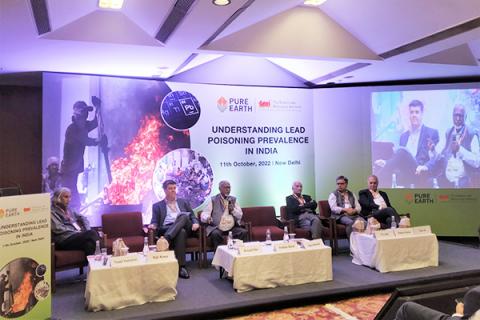Experts call for urgent state and national level action plans to tackle lead poisoning in India

New Delhi, October 11, 2022: Drawing attention to the looming global health crisis triggered by lead poisoning, particularly in India, where over 2,30,000 people die annually due to exposure to lead pollution, policymakers, scientists and researchers underscored the need for urgent responses at both the national and state levels to tackle the problem at a seminar on ‘Understanding Lead Poisoning Prevalence in India’ co-hosted by The Energy and Resources Institute (TERI) and Pure Earth in New Delhi on Tuesday.
India accounts for 26% of global deaths due to lead exposure every year and 50% of children with elevated blood lead levels globally are found in the country. Lead poisoning is associated with the loss of intelligence up to 5 IQ points. The staggering findings were part of a report jointly published by UNICEF and Pure Earth in 2020, the data of which was reviewed and published by the NITI Aayog in association with Council of Scientific & Industrial Research (CSIR) earlier this year. The contents of two reports – ‘The Toxic Truth: Children’s Exposure to Lead Pollution Undermines a Generation of Future Potential’ and ‘Assessment of Lead Impact on Human and India’s Response’ -- were the basis of the discussions and call for immediate action by experts at the seminar.
Pointing out the multiple sources of lead exposure in India, Dr Vibha Dhawan, Director General, TERI, noted, “No level of lead is safe. In India, lead is found in adulterated spices, cookware, paint, traditional medicines and cosmetics, as well as in areas where lead-acid batteries are recycled and repaired. It is imperative to remove lead contamination from our environment to protect our children and their growth.”
With children being the greatest casualty of lead poisoning with effects such as hampered brain development and damage to the central nervous system, which in turn causes reduced intelligence, attention deficit disorders and lower education attainment, Richard Fuller, Founder and President, Pure Earth, and co-author of the UNICEF-Pure Earth report, underscored the need for greater attention to the issue, “The largest number, 275 million kids with elevated blood lead levels, are in India. Over 2,30,000 people die premature annually because of lead exposure in India, yet it is one of the underreported and underfunded problems in India.”
Observing the wide prevalence of lead poisoning across the country, with 23 states exceeding the 5ug/dL blood lead level (BLL) limit, according to the CSIR NITI Aayog report, Dr Rakesh Kumar, Officer on Special Duty, CSIR, observed, “The states of Bihar, Uttar Pradesh, Madhya Pradesh, Jharkhand, Chhattisgarh and Andhra Pradesh account for 40% of India’s population with average blood lead levels of more than 7 μg/dL which is a cause of concern.” Highlighting the wide-ranging impacts of lead poisoning, commonly called the ‘silent killer’, Dr TK Joshi, Technical Advisor, UNOPS India, noted, “Because of lead poisoning in children, India loses $236 billion in GDP per year, i.e approximately 5% of economic growth. Childhood lead poisoning should command an urgent national and state level response. But because lead wreaks its havoc silently and insidiously, it often goes unrecognized.”
Dr Thuppil Venkatesh, Director, National Referral Centre for Lead Projects in India and National Chairman, Indian Society for Lead Awareness and Research, elaborated on the health impacts of lead poisoning. “Lead is a potent neurotoxin that, with even low-level exposure, is associated with a reduction in IQ scores, shortened attention spans and potentially violent and even criminal behaviour later in life,” he said.
Commenting on the crucial role that needs to be played by the government and the private sector in effectively addressing lead poisoning, Dr Rajiv Kumar, Chairman of Pahle India Foundation and former vice chairman, NITI Aayog, said, “The scale and intensity of lead poisoning in India, particularly among children, is indeed serious and cannot be ignored any longer. Therefore, this is an appropriate time for a national mission to effectively and comprehensively tackle lead contamination in India from multiple sources.”
About TERI
The Energy and Resources Institute (TERI), based in India, is an independent, multi- dimensional research organization with capabilities in policy research, technology development, and implementation. An innovator and agent of change in the energy, environment, climate change and sustainability space, TERI has pioneered conversations and action in these areas for nearly five decades. Headquartered in New Delhi, it has centres in six Indian cities, and is supported by a multi-disciplinary team of scientists, sociologists, economists, engineers, administrative professional and state-of-the-art infrastructure.
About Pure Earth
Pure Earth is an international nonprofit headquartered in New York with a registered office in New Delhi, India dedicated to saving and improving lives and protecting the planet by reducing disease-causing pollution and cleaning up toxic hot spots in low and middle-income countries. Since its inception in 1999, Pure Earth and its field teams have completed more than 120 projects in 27 countries using best in class science, analytics, and engineering practices to identify toxic hot spots and teach communities how to improve soil, water, and air quality with pragmatic, cost-effective solutions. Pollution is the largest environmental cause of death and disease in the world, stealing 9 million lives each year, and disabling hundreds of millions of children. Pure Earth prioritizes actions that protect the developing brains and bodies of children and pregnant women living in toxic hot spots with a specific emphasis on lead and mercury exposure. Partnering with governments, communities, and industry leaders, Pure Earth aims to elevate pollution as a global priority, create sustainable change, and support a healthier future.
YouTube Link of the seminar on Understanding Lead Poisoning Prevalence in India:
